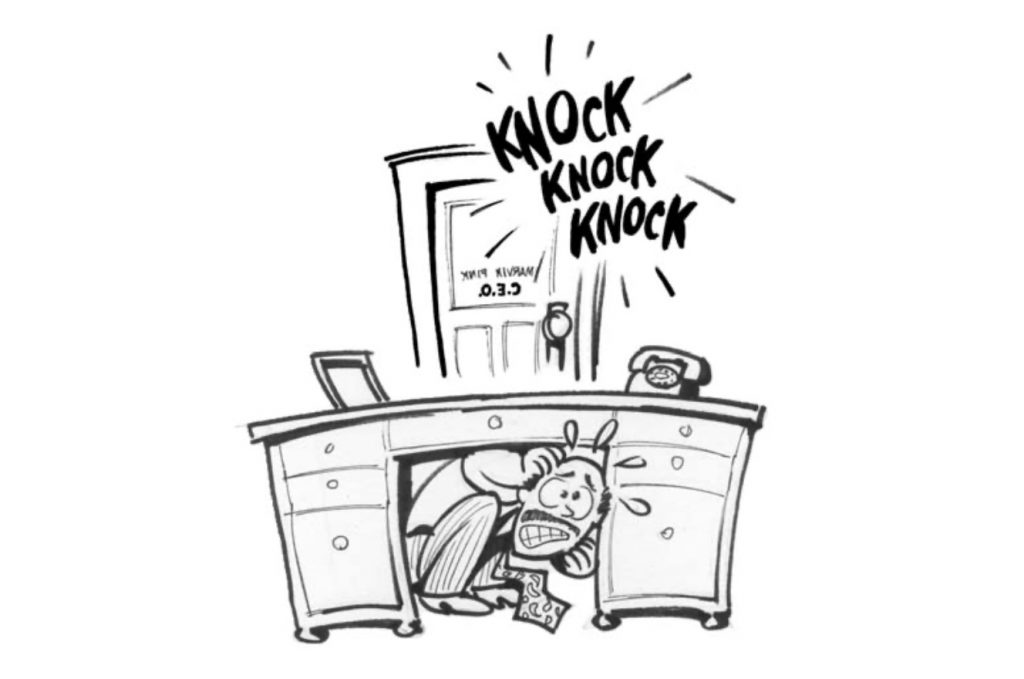HANDLING NEGATIVE NEWS
Anyone who ever watched Mike Wallace grill someone on 60 Minutes knows how hot that fire can be. But you don’t have to go hiding under your desk at the first sign of a crisis.
The truth is most reporters aren’t like Mike. We’re not trying to trip you up so we can barbecue you on the six o’clock news. Most of us just want to get a balanced story together in time for air.
Negative news happens. The question becomes, “How do you deal with the media to make sure an already bad story doesn’t get worse?”
The patterns of responses to negative news can be broken down into categories. And these approaches are all too familiar to working journalists.
THE OSTRICH
As the name suggests, this person sticks his head in the sand and hopes the story will go away. Bad idea. Stories don’t go away; they just go on without you. Instead of having someone from the company responding to help balance the report, the reporter ends up standing in front of your building staring at the camera and saying something like, “The company refuses to comment.”
I’ve never understood why organizations would pass up an opportunity to explain what happened. All they’re doing is forcing the reporter to search for other people to interview, such as neighbors, employees, and people on the street who may or may not have facts.
The story will unfold with or without you. Trust me, you’re usually better off being a part of the story than not.
DENY, DENY, DENY
This is another favorite reaction to negative news. It’s the “when in doubt, deny” approach. President Clinton used it for about two years in fighting off allegations of sexual impropriety with Monica Lewinsky. Who can forget the now infamous words “I did not have sex with that woman, Ms. Lewinsky”?
Well, I guess denial will work if you truly did nothing wrong or if you know for sure that the media will never, ever discover the truth. Unfortunately for the guilty, sooner or later the real story almost always comes out. We in the media are like sharks. If we smell blood, we’ll keep circling. President Clinton can attest to that. Following his first denials of the affair, every news conference or public appearance included some shouted questions about the scandal. Wouldn’t he have been much better off just coming clean when the scandal first broke?
The public is very forgiving. We all make mistakes. But we’re seldom so understanding when we catch someone lying to us.
HALF-TRUTHS
This strategy isn’t much better than an outright denial. It’s the “I didn’t inhale” approach.
Remember Vanilla Ice? He became an overnight sensa-tion as a white rap artist with his hit Ice, Ice, Baby. The press release his publicists sent to reporters said he grew up in the ghetto. But when word leaked out that he was actually raised in an affluent suburb of Dallas, Ice was in hot water.
When confronted with the discrepancy, he didn’t do enough to distance himself from the inaccuracy. Ice’s career began to melt down. He’s now regularly featured on VH1 in a popular segment about fallen stars. When asked what he would have done differently, Vanilla Ice now admits he wishes he’d just come clean.
HONESTY
Which brings me to the final category. This is the “fess up” strategy. The irony is, even though it’s the most effective way to deal with negative news, it seems to be the least often used.
In the late ’80s, reporting in Lincoln, Nebraska, I was assigned to cover politics, and at the time Bob Kerrey was governor. He held a weekly news conference and took questions about whatever issue happened to be in the news. One week the story that everyone was talking about was how the governor had suddenly switched his position on a bill before the legislature.
A few minutes before the news conference was to begin, the reporters made an informal alliance. We vowed not to let the governor tap dance around the issue. We would keep asking follow-up questions until he admitted to the flip-flop.
As soon as Kerrey entered the room and began taking questions, we nailed him, “Governor, why did you withdraw your support from the legislation now before the Senate?” I’ll
never forget his answer. Never have three words let so much energy out of a room.
“Changed my mind,” he said. We were stunned. We’d all prepared to gang up on him. But there was no denial. He didn’t try to candy-coat anything. He had simply exercised a very human quality—changing his mind. I guess people are allowed to do that, aren’t they?
He went on to explain why he had changed his mind, but even if he hadn’t, the result would have been the same. I left the room that day thinking how shrewd he had been. He was honest. We hadn’t counted on that. Had he denied the flip-flop, we would have been all over him for days. Instead, it was a one-day story.
WHAT WERE YOU THINKING?
When actor Hugh Grant was caught with a prostitute behind the back of his then-girlfriend Elizabeth Hurley, he faced a potentially career-wrecking event. Weeks before the news broke, he’d been booked as a guest on The Tonight Show.
Fearing what Jay Leno would ask him, many stars would have canceled the appearance. Grant instead bravely faced the fire. “Hugh, what were you thinking?” Jay asked in disbelief. And what did Hugh do? Did he deny? Did he tell a half-truth? No, he smiled nervously and with that sheepish smile he’s become famous for, said, “That’s the problem. I wasn’t thinking.” And the audience loved it. Hugh’s relationship with Elizabeth didn’t survive the scandal, but he kept his career on track by simply telling the truth.
APOLOGIZE
When an apology is in order, do it immediately. I’m sure corporate attorneys will disagree with me on this one. Many companies are so scared of litigation, they never admit any mistakes that could come back and haunt them. But I would argue that, if your company truly messed up, there’s going to be a lawsuit anyway. And how much is your corporate image worth? No jury award is as expensive as the damage you can do yourself by mishandling a crisis.
SHOW YOUR HUMAN SIDE
Large companies can appear cold and intimidating from the outside. That’s why it’s so important to put a human face on any mistake.
Parkland Hospital in Dallas delivers more babies each year than any hospital in the country. But on the very same week that it was featured on Good Morning America as the busiest baby hospital in the nation, Parkland experienced a potential public relations nightmare.
Two infants with the same last name were delivered stillborn on the same day. A staff member mixed the names up and before the mistake was discovered, one of the families had already buried the wrong baby. The second baby was still in the morgue.
I arrived at the hospital with the family whose baby had already been buried. They wanted answers, and they wanted their baby’s body exhumed as soon as possible.
While the family waited in another room, I found myself sitting across from April Foran, the public relations director for Parkland. “Jeff, I’m just heartbroken,” she told me. “This is horrible. I can’t imagine what that family is going through.”
I made a suggestion. Since she was going to have to talk to the family in a few minutes anyway, I urged her to allow us to be there with a camera. “April, I can see the pain on your face. If you will allow me to show your compassion, to my audience, I’m sure the story will come off looking a lot better for the hospital.”
What viewers saw that night on the news wasn’t the cold exterior of a hospital but rather the warmth of a woman
who truly felt for this family. April appeared to be almost in tears herself as she apologized to the family and promised that the hospital would do everything it could for them. The story that night was one filled with compassion thanks to April allowing us to put a human face on the hospital.
APPOINT A SPOKESPERSON
Like April, whomever you designate as a media spokesperson should be warm, friendly, and comfortable on camera. That may sound pretty basic. But many police departments, for example, appear to do very little screening before selecting their public information officers.
Remember, your spokesperson will embody your organization. And never is that more important than in a crisis. The spokesperson should be confident, reassuring, and most of all, human.
All too often companies faced with negative news will send someone out to read a cold unemotional press release. It’s understandable that you may not want your spokesperson to stray too far from the facts, especially when a crisis is still unfolding. But do yourself a favor and find someone who can speak from the heart and show compassion.
NEVER SHOW ANGER TOWARD THE MEDIA
Anger on camera rarely plays well with the public. I know reporters aren’t held in the highest esteem, but getting mad at us on camera isn’t the wisest way to respond to tough questions.
I once covered a horrible accidental police shooting. An officer responding to a burglar alarm had accidentally shot the homeowner. The following day the police chief held a news conference. He started out doing everything right, showing great concern and promising that the city would do all it could to help the victim’s family.
But when the questions turned to the subject of police procedure, the chief became increasingly angry. Finally, after the fourth or fifth such question, the chief snapped, “That’s not what we’re here to talk about!” and abruptly ended the news conference.
I understood that police departments are like a family and that the chief may have felt like his family was being attacked. But in this case, he could have redirected the questions another way. Even a simple, “We’ll get into that at another time; today we’re too shaken up,” might have worked. Instead, the chief’s compassion and composure were replaced by a look that was combative.
The chief’s outburst didn’t fit into my story, so my viewers never saw it. Besides, I had known the chief for years and decided to give him a break. The chief had built up enough good-will with the assembled media that I don’t think anyone hung him out to dry on the news. But any one of us could have.
In fact, his outburst could have become the story, had we chosen to take that angle. Attacking the media is a poor strategy. Print reporters have an old expression: “Never pick a fight with anyone who buys ink by the barrel.”
NEWS YOU CAN USE
- Don’t stick your head in the sand. The reporters will still be there when you finally come up for air.
- Denying works only when you’re truly innocent.
- Half-truths leave you half-naked when the whole truth comes out.
- Honesty really is the best policy. If you mess up, ’fess up. Apologize and move on.
- Don’t be afraid to show your human side.
- Appoint a spokesperson who’s comfortable on camera.
- *Never show anger, even when you’re being attacked. It just doesn’t play well on camera. The audience will decide if the reporters are being too tough. It’s much better to play the victim of a hostile media instead.

